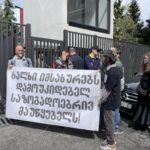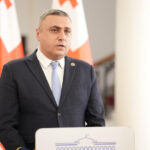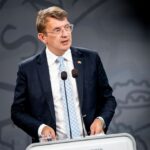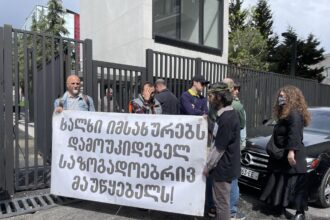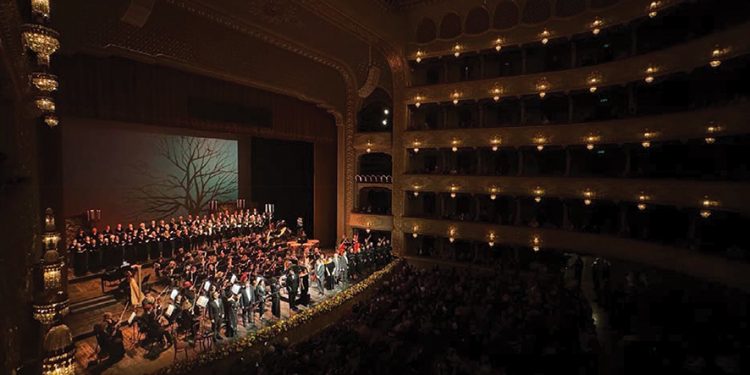The Tbilisi Opera and Ballet Theater hosted a centennial celebration for Otar Taktakishvili. It was a night filled with retrospection and reverence. The program, a rich tapestry interwoven with recorded archive footage, was a multi-layered journey into Taktakishvili’s musical landscape. It was a powerful reminder of his influence on Georgian music and his compositions’ universality, which transcends time and space.
The memorial evening was a tribute not only to the man but also to the stories he created through music. The Tbilisi Opera and Ballet Theater soloists, choir, orchestra, and Ensemble ‘Rustavi’ performed live, and historical recordings were added to the performances. This duality of past and present created a poignant fusion where the boundary between immediacy and memory blurred. The audience was immersed in both a celebration and meditation on the endurance and art.
The Immortal Mindia’ – From Storytelling To Sonic Power
The night began with Mindia, Taktakishvili’s most important operatic work. The Tbilisi Opera Orchestra and Choir gave a powerful opening, setting the mood for the emotional depth of the evening. Giorgi Sturua’s first live aria brought the audience into Mindia’s inner world, with its melancholic melodies that carry the weight of ancient Georgian legends. Sturua’s vocal interpretation was full of pathos and vulnerability, giving the character both strength and vulnerability.
Sulkhan’s Gvelesiani’s performance of Chalkhia’s scene and ballade in Act 2 was equally moving as he navigated the complex emotional layers of the character. Taktakishvili’s compositions brought ancient characters to life, with their struggles and desires. Archival recordings of Georgian singers from the past were played in contrast to these live performances. The recordings of Merani, featuring Zurab Ajafaridze, and Separation with Zurab Sotkilava, reverberated like echoes, bringing the past into the current.
Melodic Nostalgia for the First Love
The First Love, a cornerstone of Taktakishvili’s operatic achievements was treated both live and recorded throughout the evening. This provided a vivid contrast between old and new interpretations. Liana Kalmakhelidze’s live performance was a highlight. Her voice blended tenderness and sadness in a timeless way. This was juxtaposed with archival recordings by Teimuraz Guggushvili of Ertaoz’s arioso and other key arias from Imeri Kavsadze & Eldar Getsadze. The result was an emotional kaleidoscope which underscored the eternal nature love as expressed through music.
The live performance of Kalmakhelidze gave Margalita a contemporary resonance. The inclusion of historical recordings reminded audience members of the different generations who have brought to life these characters. The audience was amazed at how Taktakishvili’s music transcends individual performances and bridges these eras.
In the footsteps of Georgian Legends Rustaveli & Nikoloz Baratashvili
In the Steps of Rustaveli was the next piece of the evening, in which Giorgi Chlidze and the Tbilisi Opera Chorus performed Vardzia & Palestina, paying homage to Georgia’s cultural and literary heritage. The vocal performances were infused with reverence for Taktakishvili’s compositions, as well as the history and landscapes that they evoke. These pieces, inspired from Georgia’s medieval writer Shota Rustaveli transported listeners to the heart of Georgian Identity.
The choral interludes and orchestral harmonies reverberated in a sense ancient continuity, as though the music were carved directly into the rocks of Vardzia. The retrospective recordings that were released later served to highlight the lasting impact Taktakishvili’s work had on Georgian culture.
The climactic moment was Nightfall on Mtatsminda by Nikoloz Baatashvili. Giorgi Sturua’s and David Gvelesiani’s duet, supported Ensemble Rustavi, and the Tbilisi Opera Choir delivered a dramatic and stirring performance. Taktakishvili was able to capture the emotional weight of the piece, which is based on the life of Georgian romantic poet Nikoloz Baratashvili.
The Moon Abduction: A Return to Myth
The evening culminated with selections from The Abduction of the Moon. This opera is steeped in Georgian Folklore. Iano Alibegashvili captured the otherworldly beauty and tragic love story of the opera in his Tamar‘s Aria. The duet between Tarash, Tamar and Khatuna, performed by Khatuna and Sulkhan, was a masterful interplay between voices. Each singer embodied the tension between earthly desires and celestial separation.
The final aria of The Abduction of the Moon filled the theater, and the audience felt a sense of closure. The Tbilisi Opera Choir Orchestra closed the evening with a majestic finale, their voices and instruments swelling under the weight of Taktakishvili’s legacy.
The Pillars of the Evening
The evening’s success was not only due to the soloists, but also the collective forces who supported the musical architecture, including the Tbilisi Opera and Ballet Theatre Orchestra and Choir, Ensemble “Rustavi” and the steady conductor Zaza Azamiparashvili. Together, they brought Taktakishvili’s scores to life, with precision and passion. They created a lush sonic environment that allowed the audience be fully immersed into the composer’s world.
Under the direction of Azmaiparashvili the orchestra played with a deep feeling of dynamism, and a sense of control, seamlessly moving between the gentle lyrical passages, and the thunderous, climactic passages that define Taktakishvili’s compositions. The orchestra, under the direction of Azmaiparashvili, played with a deep sense of dynamism and control, moving seamlessly between the gentle, lyrical passages and the thunderous climaxes that define Taktakishvili’s compositions. The orchestra added layers of nuance and depth to the soloists performances, whether it was the soaring intro to Mindia, or the poignant Intermezzo from The First Love.
The Tbilisi Opera Chorus was also integral to the emotional weight of the evening. Their rich, resonant harmonies filled the theatre and enhanced the grandeur of pieces such as In the Steps of Rustaveli or The Abduction of the Moon. Their ability to combine power and subtlety was especially striking in the choral sections, where they switched from delicate, praying intonations to full, throated crescendos. This evoked the timeless beauty of Georgian folklore.
The Ensemble “Rustavi”, which embodies the soul of Georgian folk traditions, added an extra layer of authenticity to this performance. They are known for their mastery in Georgian polyphony and wove their voices throughout the evening. This was especially evident during the deeply evocative Nightfall On Mtatsminda. The ancient harmonies mirrored mountain landscapes, cultural history, and Taktakishvili’s work.
The quiet force behind the evening of musical tribute was Zaza Azmaiparashvili. His understanding of Taktakishvili’s compositions, and his sensitivity towards the needs of the soloists as well as the orchestra, allowed for a seamless blending of live and recorded elements. His pacing, which seamlessly moved between intimate, introspective moments, and sweeping, grand passages, was impeccable. It kept the audience on a journey of emotion throughout. Azmaiparashvili’s baton was the bridge between the past and present. His leadership ensured that Taktakishvili’s music resonated just as vividly today as it did 100 years ago.
A Composer for Eternity
The program ended with a haunting performance by Taktakishvili of Holy Mother, a song cycle based upon Galaktion Tabidze’s poetry. Mindia’s final aria followed, reminding the audience how Taktakishvili’s music is as immortal as the subjects it portrays.
Tbilisi, through this memorial evening paid tribute to not only a composer, but also to a man who’s work captured the heartbeat Georgia. Taktakishvili’s music, as demonstrated by the seamless integration of live performances with historical recordings, speaks to generations and keeps Georgian cultural heritage alive. The evening was more than a concert. It was a living archive that preserved and projected Georgia’s soul into the future using the universal language of song.
Review by Ivan Nechaev
Read More @ georgiatoday.ge

